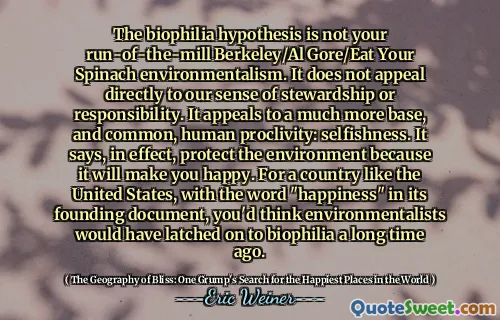
The biophilia hypothesis is not your run-of-the-mill Berkeley/Al Gore/Eat Your Spinach environmentalism. It does not appeal directly to our sense of stewardship or responsibility. It appeals to a much more base, and common, human proclivity: selfishness. It says, in effect, protect the environment because it will make you happy. For a country like the United States, with the word "happiness" in its founding document, you'd think environmentalists would have latched on to biophilia a long time ago.
The biophilia hypothesis stands out from traditional environmentalist views by focusing on personal happiness rather than a sense of duty toward nature. It suggests that protecting the environment is ultimately beneficial for individual well-being, appealing to the selfish desires inherent in human nature. This concept highlights that caring for the environment can enhance one’s quality of life, making it a more relatable argument for many people.
In the context of the United States, where the pursuit of happiness is central to its ethos, the biophilia hypothesis should resonate strongly. Eric Weiner's exploration in "The Geography of Bliss" indicates that environmentalists could more effectively leverage this idea. By framing environmental protection as a pathway to personal joy, they might garner broader support for conservation efforts among those who might overlook traditional stewardship arguments.






